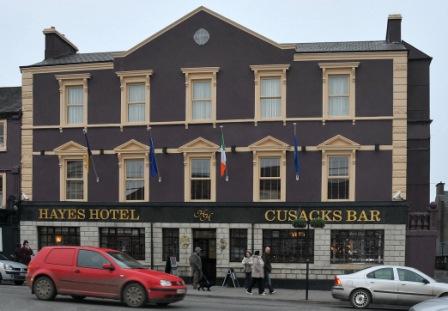 This year, 2009, will see the Gaelic Athletic Association (GAA) celebrate its 125th anniversary. The man most credited with the original impetus behind this formation was a west of Ireland man, Michael Cusack, a native of County Clare. Cusack’s original dream was to resurrect the ancient Tailteann Games and establish an independent organisation to promote young athletes, however hurling and Gaelic football would over the following years eventually predominate.
This year, 2009, will see the Gaelic Athletic Association (GAA) celebrate its 125th anniversary. The man most credited with the original impetus behind this formation was a west of Ireland man, Michael Cusack, a native of County Clare. Cusack’s original dream was to resurrect the ancient Tailteann Games and establish an independent organisation to promote young athletes, however hurling and Gaelic football would over the following years eventually predominate.
Michael Cusack, a native Gaelic speaker, was born in Carron, County Clare in 1847. Regarded by many as having a rather complex personality, he had developed a passion for Gaelic games which was matched only by his love of his native local environment the wild and beautiful limestone landscape of the Burren, where he had been born and raised. Cusack pursued an academic career, eventually becoming a teacher at Blackrock College, in Dublin. In 1877 he set up his own school, known as the Civil Service Academy. The aim of the latter was to prepare students for examinations, necessary to gain them admission into the British Civil Service. This school which was better known as “Cusack’s Academy,” was extremely successful. The many pupils then attending this establishment, were encouraged to get involved in all and any forms of physical exercise. Cusack greatly disappointed by the apparent decline in Irish native games established a hurling clubs at his Academy and thus began his dream to re-establish hurling as the national pastime.
Meanwhile, a farmer from Carrick-on-Suir, Maurice Davin, an outstanding athlete who won international fame in the 1870’s had been actively campaigning for a body to control Irish athletics, so at 3.00pm on Saturday,1st November 1884 at the Haye’s Hotel, Thurles, Co.Tipperary, a meeting of like-minded individuals took place.
This day was chosen for its mythological significance, for according to Irish legends, November 1st was the day when the power of the Fianna died and Cusack’s choice of day was meant to symbolise the rebirth of these mythological Irish heroes, whose aims were; Glaine ár gcroí (Pureness of heart); Neart ár ngéag (Strength of limb); and Beart de réir ár mbriathar (Deeds to match words).
Following this meeting, a committee called The Gaelic Athletic Association for the Cultivation and Preservation of National Pastimes was established. Those elected to form this committee were John Wyse Power, John McKay, J. K. Bracken, Joseph O’Ryan, Maurice Davin, Michael Cusack and Thomas St. George McCarthy. This name was eventually shortened to “The Gaelic Athletic Association“. Others believed to be in attendance at this inaugural meeting included Frank Moloney, Nenagh, William Foley,Carraig-on-Suir, William Delehunty, Thurles, John Butler, Thurles, and William Cantwell, Thurles. Maurice Davin who had presided at this meeting was elected the GAA’s first president and historically the only president ever to serve two terms in office.
The aims now set by this committee were as follows:
• To foster and promote native Irish pastimes
• To open athletics to all social classes
• To establish hurling and football clubs which would organise matches between counties
Within a few weeks of the organisation’s foundation, the then Archbishop of Cashel, Thomas Croke gave this organisation his approval and became its first patron. Its other patrons included both Michael Davitt and Charles Stewart Parnell.
Archbishop Croke would later introduce a new rule to the organisation which forbade members of the GAA from playing foreign games, such as tennis, cricket, polo and croquet. Given later controversies which concerned the playing of ‘foreign games’ and the banning of members of the British armed forces and police from joining, it is notable that one founder member, Thomas St. George McCarthy a native of Bansha, Co.Tipperary was a capped international rugby player, having played for Ireland against Wales in 1883 and was also a District Inspector of the Royal Irish Constabulary (RIC). Also, founder J.K. Bracken, latter the father of Brendan Bracken,who was to become Winston Churchill’s closest friend and Minister for Information in Churchill’s wartime government and then later became a member of the British Cabinet during World War II.

Leave a Reply